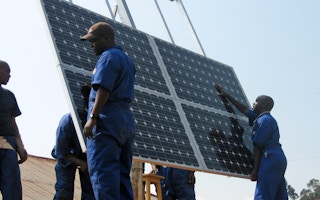Whatever the motive forces behind the Trump insurgency, Brexit or other populist eruptions, for some voters there was a nagging fear that mechanisation, robotics, machine learning, big data and artificial intelligence (AI) will help put paid to a growing casualty list of blue-collar jobs. But that’s just the beginning of the story.
As we dig ever-deeper into the accelerating world of AI as part of our Project Breakthrough initiative with the UN Global Compact, the likelihood that a growing spectrum of white-collar jobs will also end up in the dustbin of history seems ever stronger. Again, nothing new there, though the scale of what’s about to happen is even spooking people like Bill Gates and Elon Musk.
But it was only when I did the closing keynote at a recent event organised by The Crowd—which had been opened by DeepMind co-founder Mustafa Suleyman—that I was forced to acknowledge just how vulnerable many jobs within the sustainability sector, or green-collar jobs, are going to be too.
Sadly, a diary clash meant that I missed Suleyman’s speech. As the man says, six years ago the co-founders of DeepMind were seen as “pretty crazy, pretty ungrounded” and the £400 million Google paid for the London-based AI and machine-learning start-up in 2014 must have had some of those early critics scratching their heads in wonder.
The future’s already here—and someone seems to be sitting on the fast forward button. As Suleyman explains it: “From smartphone assistants to image recognition and translation, machine learning already helps us in our everyday lives. But it can also help us to tackle some of the world’s most challenging physical problems—such as energy consumption.
“Large-scale commercial and industrial systems like data centres consume a lot of energy, and while much has been done to stem the growth of energy use, there remains a lot more to do given the world’s increasing need for computing power.”
As far as Google’s energy management efforts were concerned, he adds: “Reducing energy usage has been a major focus for us over the past 10 years: we have built our own super-efficient servers at Google, invented more efficient ways to cool our data centres and invested heavily in green energy sources, with the goal of being powered 100 per cent by renewable energy. Compared to five years ago, we now get around 3.5 times the computing power out of the same amount of energy.”
Then he notes: “Major breakthroughs, however, are few and far between—which is why we are excited to share that by applying DeepMind’s machine learning to our own Google data centres, we’ve managed to reduce the amount of energy we use for cooling by up to 40 per cent. In any large-scale, energy-consuming environment, this would be a huge improvement. Given how sophisticated Google’s data centres are already, it’s a phenomenal step forward.”
But how was this done? As Wired sums it up, DeepMind’s machine learning team “trained” algorithms to manage energy use way better than an ordinary human would.
“Conventionally a human manually tweaks a lot of the knobs that control the operation of the data centre,” Suleyman says. “There’s obviously a lot of variation in performance across all the data centres because each human performs quite different.”
And the story doesn’t end there. “There are lots of other applications outside of Google,” he hints.
“
Machine learning already helps us in our everyday lives. But it can also help us to tackle some of the world’s most challenging physical problems—such as energy consumption.
Mustafa Suleyman, co-founder, DeepMind
So what sort of green-collar jobs are most vulnerable to disintermediation by AI? Well, at the most basic level, anyone aspiring to a lifetime’s outdoor work, cleaning and polishing solar arrays, might want to look at what companies like Aerial Power, Ecoppia or Mirakikai are up to. Whether their cleaning machines run on rails or come in the form of broom-wielding drones, this one’s only a matter of time.
However, it wasn’t the DeepMind angle that had me thinking of setting up a local chapter of the Green Collar Worker Preservation Society, so much as the work now being done by our hosts—The Crowd—in the exponential energy space.
Originally called Green Mondays, The Crowd launched the same year that we started Volans—2008. Then Jim Woods and his team took things to a new level, evolving from talks and discussions over a glass of red or white to the active crowdsourcing of green business ideas and strategies.
Now in turn, The Crowd is budding off The Curve, whose impact may include the accelerating disintermediation of conventional environmental and energy management consultants. This is a peer-to-peer learning platform that enables users to access best practice—and the wisdom of like-minded and like-briefed professionals.
Over time, the platform’s potential to replace technical experts in such fields as safety, health, environment and resource efficiency will proceed along some form of exponential curve—as the platform’s name suggests.
Don’t say you weren’t warned. And if you want to get a sense of how this might play out, track the evolving Partnership on Artificial Intelligence to Benefit People and Society. Launched earlier this year by Amazon, DeepMind/Google, Facebook, IBM, and Microsoft, it aims to break down the barriers between AI teams to address some of the really difficult questions arising within the field.
And, green-collared or not, don’t say you weren’t invited to engage.
As the Partnership’s launch statement put it: “We also want to make it easier for those in other fields to understand, assess and engage with our scientific breakthroughs and consider the broader social and ethical impacts of our applications. By opening up the conversation about AI to a wider community, we hope to build new models of engagement, collaboration, and accountability to take the field forward in a thoughtful, positive and ethical way that benefits people and society.”
The door’s open, apparently.
John Elkington is founding partner and executive chairman of Volans, and also co-founder of SustainAbility.


















